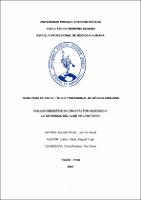Insulinoresistencia como factor asociado a la severidad del acné inflamatorio

Ver/
Descargar
(application/pdf: 922.5Kb)
(application/pdf: 922.5Kb)
Fecha
2020Autor(es)
Estrada Florián, Jazmín Jasell
Metadatos
Mostrar el registro completo del ítemResumen
Objetivo: Determinar si la insulinoresistencia es un factor asociado a la severidad del acné
inflamatorio en pacientes atendidos en el consultorio externo del servicio de dermatología
del hospital de especialidades básicas la Noria.
Material y métodos: Se ejecutó el siguiente estudio analítico, observacional, prospectivo,
transversal constituiada por una población de 68 pacientes con acné inflamatorio leve a
moderado y severo atendidos en el consultorio de dermatología del Hospital de
Especialidades Básicas La Noria; de los cuales se analizó los niveles séricos de glucosa
basal e insulina basal en ayunas; mediante el índice de Homeostasis Model Assessment
(HOMA-IR) para cada individuo, obteniéndose como resultado pacientes con
insulinoresistencia y sin insulinoresistencia.
Se utilizaron pruebas como T student para comparar medias y Chi cuadrado para comparar
proporciones. La significancia estadística se consideró significativa si la posibilidad de
equivocarse es menor al 5% (p <0.05).
Resultados: Se analizaron un total de 68 pacientes en este estudio. La prevalencia de
insulinoresistencia en los pacientes con acné inflamatorio severo fue del 57, 69%. La
prevalencia de insulinoresistencia en pacientes con acné inflamatorio leve a moderado fue
de 30.95 %.
Se encontró asociación estadísticamente significativa entre las variables en mención y se
mostró que los pacientes con insulinoresistencia tienen 3.04 mayor riesgo de padecer acné
inflamatorio severo (p=0.029; ORP 3.04; 1.10-8.41). Con respecto a las variables
intervinientes como la edad, el peso, la talla, el IMC, el sexo, la historia familiar de acné
infamatorio, el estrés, la exposición solar, el consumo de tabaco, no se halló significancia
estadística por lo que se determina que dichas variables no modifican el efecto de la
insulinoresistencia en la severidad del acné. (p > 0. 05)
Conclusiones: La insulinoresistencia es un factor asociado a la severidad del acné
inflamatorio. Objective: To determine if insulin resistance is a factor associated with the severity of
inflammatory-acne in patients treated in the external office of the dermatology service of the
basic specialty hospital La Noria.
Material and methods: The following analytical, observational, prospective, cross-sectional
study was carried out, consisting of a population of 68 patients with mild to moderate and
severe inflammatory acne treated at the dermatology clinic of the Hospital de Especialidades
Básicas La Noria; of which the serum levels of fasting basal glucose and basal insulin were
analyzed; by means of the Homeostasis Model Assessment index (HOMA-IR) for each
individual, obtaining as a result patients with insulin resistance and without insulin
resistance.
Tests such as T student were used to compare means and Chi square to compare
proportions. Statistical significance was considered significant if the possibility of being
wrong is less than 5% (p <0.05).
Results: A total of 68 patients were analyzed in this study. The prevalence of insulin
resistance in patients with severe inflammatory acne was 57, 69%. The prevalence of insulin
resistance in patients with mild to moderate inflammatory acne was 30.95%. A statistically
significant association was found between the variables mentioned and it was shown that
patients with insulin resistance have a 3.04 higher risk of suffering from severe inflammatory
acne (p = 0.029; ORP 3.04; 1.10-8.41). Regarding the intervening variables such as age,
weight, height, BMI, sex, family history of inflammatory acne, stress, sun exposure, and
smoking, there was no statistical significance for what it determines that these variables do
not modify the effect of insulin resistance on the severity of acne (p> 0. 05).
Conclusions: Insulin resistance is a factor associated with the severity of inflammatory
acne.
Palabras clave
Colecciones
- Medicina Humana [2969]

